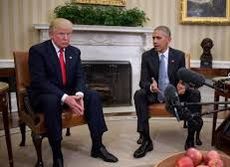
Consider instead the events of this past November to January. This was a time not of consolidation and bridge building but rather of basking in the trappings of power and settling old scores. Opportunities for briefings were passed up, chances to reach out to rivals were ignored, and, rather than lowering the temperature, instead we saw the ramping up feelings of vulnerability among those people who were perceived to be part of his predecessor's "circle". Now, I don't imagine that many school leaders will accuse the person whom they are replacing of "wire tapping" their office, but all too often transitioning Heads make many of the same mistakes.
The first, and most common, mistake is failing to take advantage of the experience and insights of the person that you are succeeding. Regardless of whether they are leaving by choice, or have been pushed out the door, they are the only ones in the school community who really understand how things work (or don't). Most new Heads cast themselves as the anti-incumbent. They represent the forces of change, of bigger and better, of new and improved. Inexperienced leaders will think that this means that they should keep, slightly disdainfully, at arm's length so that they can reinforce their newness.
There is a saying in the United States that "we have one President at a time". During the transition period last fall, we saw the establishment of the Trump Tower Alternative White House. Aside from watching the parade of foreign dignitaries paying homage to the new king, we have now also learned that members of the President-elect's circle (and perhaps even him) were busy assuring foreign powers and powerful interest groups that things would soon be very different. Incoming Heads can make similar mistakes, inviting email contact from current faculty as a way to get the "inside scoop" and opening the door for self-serving members of staff to try to get an in with the new boss. This reliance on easily obtained gossip and gripes, as opposed to taking on the hard work of finding out what was really going on, is seductive, but ultimately highly destructive to the health of the school.
Years ago, as I was transitioning from Bermuda to my current school in North Vancouver, I received a series of phone calls and emails giving me unsolicited advice about what programmes should be cut, and in one case, what teachers should be fired before I even got there. It was enlightening, not about the school programmes or personnel cited, but about the people reaching out. In each case I replied back that if they had these concerns, they should raise them with their current Head and cc'd him on my responses. The contacts dried up pretty quickly.
Some incoming Heads even go a step further, as we see in the Trump White House, of bad-mouthing the incumbent and boasting of big things to come. The result is as predictable as it is damaging. The school community becomes polarized between the "old" and the "new" and rather than bringing people together with a new vision, the transitional leader decides that she or he needs to blow things up before they can chart their own course. This "repeal and replace" approach not only attempts to delegitimize the out-going Head, but also basically insults and alienates the large plurality (or majority) who were happy and proud of what they were already doing.
The risk is that when Day One finally arrives, the incoming leader has already alienated a significant part of the faculty, staff and parent body and squandered much of the good will and hopes for success that help to bring the school together and put it on the path of positive change.
But, let's assume that you have avoided all (or most) of these mis-steps. You've officially taken over, what comes next? Next post we'll look at real first impressions.

 RSS Feed
RSS Feed